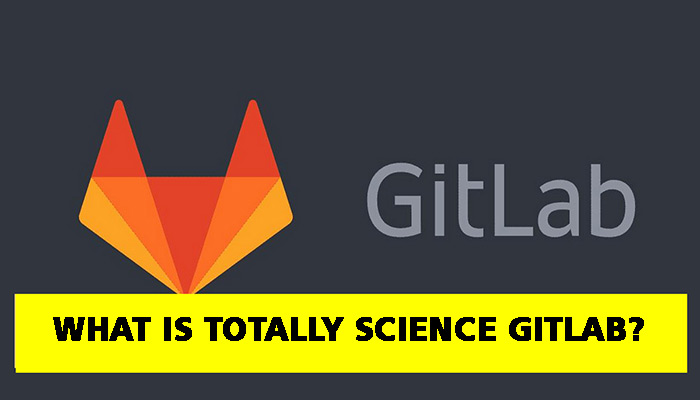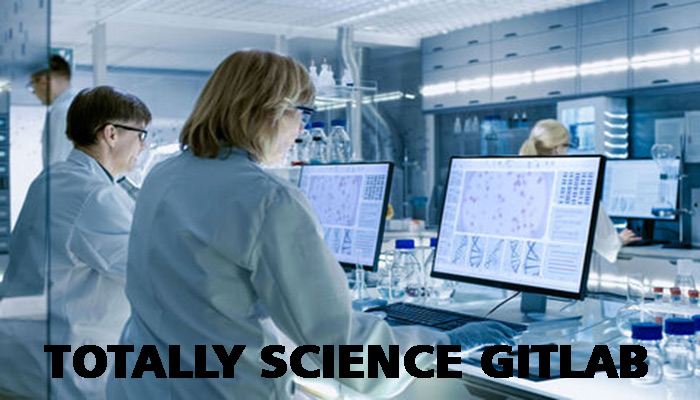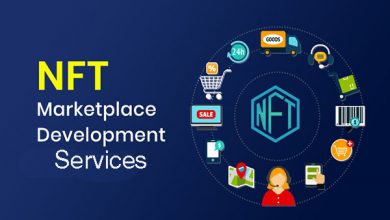What is Totally Science GitLab? Features & How to Use it?
Totally Science Gitlab? A New Updated Overview 2023

Scientific research is a dynamic and collaborative endeavor that thrives on precision, innovation, and collaboration. In the digital age, scientists and researchers require a platform that can effectively facilitate their work, enabling seamless collaboration, efficient data management, and robust version control. Totally Science GitLab emerges as a game-changer in this realm, offering a comprehensive suite of features designed specifically for the scientific community.
In this article, we will delve into the world of Totally Science GitLab and explore how it revolutionizes scientific research and collaboration. We will discuss its key features, advantages, and benefits, as well as provide practical guidelines for scientists to maximize the potential of this platform. Join us on this exciting journey as we uncover the power of Totally Science GitLab in advancing scientific knowledge.
What is Totally Science GitLab?
Totally Science GitLab is a next-generation online platform that serves as a digital laboratory, providing scientists and researchers with a dedicated space to collaborate, manage their projects, and track changes. Built upon the foundation of Git, a distributed version control system, Totally Science GitLab extends its capabilities to meet the unique needs of scientific research. It acts as a guardian for research data, a project management tool, and a collaborative environment, all in one.
Key Features of Totally Science GitLab
Totally Science GitLab is packed with features that make it a powerful tool for scientific research. Let’s explore some of its key features:
-
Version Control
One of the standout features of Totally Science GitLab is its robust version control system. It allows researchers to track changes to their work over time, making it easy to revert back to an earlier version if needed. This is particularly useful when experimenting with different approaches in research, ensuring reproducibility and maintaining a clean project history.
-
Efficient Data Management
Totally Science GitLab provides a structured way to manage research data. Researchers can organize their files, code, and other research materials in a way that makes sense to them, enhancing data organization and accessibility. With the ability to host data on their own servers and encrypted access options, data security is also prioritized.
-
Streamlined Workflows
Totally Science GitLab streamlines research workflows by automating repetitive tasks. Researchers can create pipelines and automate testing, deployment, and integration processes, saving time and effort. This allows scientists to focus more on the actual research and less on administrative tasks, increasing productivity and efficiency.
-
Collaborative Environment
Collaboration is at the heart of scientific progress, and Totally Science GitLab excels in fostering collaboration among researchers. With features such as merge requests, issue tracking, and real-time problem-solving, researchers can easily collaborate with team members, share ideas, and provide feedback, leading to more innovative and robust research outcomes.
Advantages of Using Totally Science GitLab in Scientific Research
Using Totally Science GitLab offers numerous advantages for scientists and researchers. Let’s explore some of the key benefits:
-
Collaboration
Collaboration is essential for successful scientific projects, and Totally Science GitLab makes collaboration a breeze. It provides a virtual meeting room where researchers can work together, share their work, and collaborate in real-time, regardless of geographical distances. Shared repositories, real-time editing, and discussion boards facilitate seamless teamwork, accelerating scientific progress.
-
Version Control
Version control is crucial in scientific research, as it allows researchers to track changes, revert back to previous versions, and maintain a clean project history. Totally Science GitLab’s version control capabilities ensure that researchers have full control over their work, enabling them to experiment and explore different approaches without the fear of losing progress.
-
Real-time Problem Solving
In scientific research, issues and problems are bound to arise. Totally Science GitLab’s real-time issue tracking system acts as a superhero hotline, allowing researchers to seek help, assign tasks, and track the progress of solutions. This feature ensures that issues are addressed promptly, minimizing project delays and fostering a culture of problem-solving.
-
Personalized User Experience
Every research project is unique, and Totally Science GitLab recognizes that. Researchers can customize their user experience, tailoring the platform to their specific needs. From layout customization to choosing the tools they prefer, researchers have the flexibility to create a personalized work environment that enhances their productivity and efficiency.
-
Extensible Platform
Totally Science GitLab is not limited to a specific domain of research. Whether it’s a science project, software development, or any other research endeavor, Totally Science GitLab can adapt to meet the needs of researchers from various fields. Its versatility and extensibility make it a comprehensive tool for managing and conducting scientific research.
-
Choice of Platform
Flexibility is key, and Totally Science GitLab offers researchers the choice of using a cloud-based or self-hosted solution. Researchers can choose the platform that best suits their needs and preferences, ensuring a seamless and tailored research experience. This choice empowers researchers to select the road that aligns with their research journey.
Read More – Streameast Live
How to Use Totally Science GitLab?
Using Totally Science GitLab may seem daunting at first, but with a step-by-step guide, researchers can quickly familiarize themselves with the platform. Here’s how to get started:

-
Familiarizing with the Interface
Begin by exploring the Totally Science GitLab interface. Spend some time getting comfortable with the different sections and features. You’ll find that it’s intuitive and user-friendly, making it easy to navigate and utilize its capabilities.
-
Setting up a Totally Science GitLab Account
To start using Totally Science GitLab, you’ll need to create an account. Simply provide the necessary information during the account creation process. This step is quick and straightforward, setting the stage for your research journey.
-
Creating or Importing a Project
Once you have an account, you can create a new project or import an existing one. This is where you’ll store all your research materials, data, and code. Organize your project in a way that makes sense to you, ensuring easy access and efficient management.
-
Repository Setup
After creating a project, set up a repository within Totally Science GitLab. This is where you’ll store and manage your files, code, and other research materials. Utilize the version control system to track changes and maintain a clean project history.
-
Collaborating with Team
Totally Science GitLab makes collaboration seamless. Invite team members to your project, assign tasks, and track progress. Utilize features like merge requests and issue tracking to foster effective communication and collaboration among team members.
-
Using Merge Requests
Merge requests are a key feature of Totally Science GitLab. They allow you to propose changes to your project and have them reviewed by your team before they’re merged into the main project. This ensures that code and research changes are thoroughly reviewed and aligned with project goals.
-
Utilizing Issue Boards
Issue boards are an effective way to organize your work. Create issues for tasks that need to be done, assign them to team members, and track their progress. This feature helps in managing project milestones and ensuring efficient project management.
-
Code Review
Totally Science GitLab provides built-in tools for code review, ensuring that your code meets the highest quality standards. Engage in code reviews to enhance code quality, identify potential issues, and foster knowledge sharing among team members.
-
Continuous Integration/Continuous Deployment (CI/CD)
Totally Science GitLab’s CI/CD capabilities automate parts of the development process, saving time and effort. Utilize CI/CD pipelines to automate testing, building, and deploying code changes, ensuring a smooth and efficient development workflow.
Remember, mastering Totally Science GitLab takes practice. Don’t be afraid to explore its features, experiment with different workflows, and continuously learn and adapt to maximize its potential for your research projects.
Read More – Filmyzilla Today
Benefits of Using Totally Science GitLab in Scientific Research
Totally Science GitLab offers a range of benefits that directly address the challenges scientists face in their research endeavors. Here are some of the key benefits:
-
Improved Reproducibility
Reproducibility is a cornerstone of scientific research. Totally Science GitLab’s version control system ensures that every change made to code or data is meticulously documented, making it easier to reproduce experiments and validate results. By maintaining a clean project history and preserving previous versions, researchers can confidently reproduce their work.
-
Efficient Data Management and Versioning
Managing large datasets is a challenge in scientific research. Totally Science GitLab provides a secure repository for data, allowing researchers to organize, version, and manage their data effectively. The version control system ensures that changes to data are tracked and documented, enhancing data organization and minimizing the risk of data loss.
-
Collaboration Across Research Teams
Collaboration is vital for scientific progress, and Totally Science GitLab fosters a collaborative environment. Researchers can easily collaborate with team members, share their work, and provide feedback. Whether working in the same lab or remotely, researchers can seamlessly collaborate, fostering a culture of shared knowledge and accelerating scientific progress.
-
Tracking and Analyzing Changes
In scientific research, even minor changes can have a significant impact. Totally Science GitLab’s detailed change tracking and analysis tools empower researchers to understand how their projects evolve over time. This level of insight enables informed decision-making, facilitates troubleshooting, and refines research methodologies.
Read More – Tamilyogi Isaimini
Totally Science GitLab Extensions and Integrations for Scientific Analysis
To enhance scientific research, Totally Science GitLab seamlessly integrates with various third-party tools and services. Here are some notable integrations:
-
Jupyter Notebooks
Jupyter Notebooks are widely used for interactive data analysis. Totally Science GitLab’s integration with Jupyter simplifies version control and notebook collaboration. Researchers can leverage the power of Jupyter within the Totally Science GitLab environment, making data analysis more efficient and reproducible.
-
Cloud Platforms
For large-scale scientific computing and data analysis, researchers can connect Totally Science GitLab to cloud platforms such as AWS, Google Cloud, or Azure. This integration provides scalability and flexibility, allowing researchers to leverage cloud resources as needed, enhancing computational power and efficiency.
Use Cases in Scientific Research
Totally Science GitLab’s versatility becomes evident when we examine its applications in various scientific domains. Let’s explore some compelling use cases where Totally Science GitLab has been pivotal in advancing research:
-
Genomic Research
Genomic research involves analyzing vast datasets and complex algorithms. Totally Science GitLab’s data management and version control capabilities provide genomics researchers with the tools to navigate this intricate landscape. Researchers can collaborate on genomic projects, track changes, and ensure reproducibility.
-
Environmental Modeling
Environmental modeling requires extensive data management and complex simulations. Totally Science GitLab’s integration with data repositories and CI/CD capabilities empowers environmental scientists to run simulations efficiently, manage data effectively, and collaborate seamlessly with colleagues worldwide.
-
Drug Discovery
The pharmaceutical industry relies on cutting-edge research to develop life-saving drugs. GitLab’s project management features and collaborative workflows streamline drug discovery projects. Researchers can manage experiments, track changes to molecular models, and ensure data integrity.
-
Astrophysics
Astrophysics involves the analysis of massive datasets from telescopes and simulations of celestial phenomena. Totally Science GitLab’s version control and containerization support enable astrophysicists to manage data, run simulations, and collaborate on groundbreaking discoveries.
Read More – Stream2Watch
Best Practices for Scientists on Totally Science GitLab
To maximize the benefits of Totally Science GitLab in scientific research, scientists should adopt best practices that ensure efficiency, reproducibility, and collaboration. Here are some essential guidelines:
-
Structuring Research Projects
Establishing a well-organized project structure is the foundation of successful research. Scientists should define clear directory hierarchies, adhere to naming conventions, and document their projects effectively. This structure simplifies project navigation, aids in sharing and reproducing research, and ensures a streamlined workflow.
-
Managing Data and Code Repositories
Separating data and code repositories is a best practice that promotes data integrity and simplifies version control. Scientists should establish a clear data management strategy, link data repositories to their GitLab projects, and ensure adherence to data protection and privacy regulations.
-
Writing Effective Commit Messages
Clear and informative commit messages are essential for tracking changes and understanding project history. Scientists should follow standardized commit message formats, describing the purpose and impact of each change. This practice enhances collaboration, aids in troubleshooting, and ensures a comprehensive project history.
-
Collaborative Workflows and Code Reviews
Scientific research often involves multiple contributors. Establishing collaborative workflows, leveraging features like merge requests, and conducting regular code reviews enhance collaboration and code quality. This practice promotes knowledge sharing among team members, improves code reliability, and ensures project alignment.
-
Embracing Open Science Principles
Totally Science GitLab supports open science principles, emphasizing transparency, accessibility, and collaboration in research. Scientists should leverage GitLab’s project-sharing capabilities to share their work with peers and the global scientific community. By adopting open access and open data principles, scientists can foster a culture of knowledge exchange and contribute to the advancement of science.
Read More – What is Amazons GPT44x
Security and Compliance in Totally Science GitLab
In scientific research, protecting the integrity and security of data is of paramount importance. Totally Science GitLab prioritizes data security and compliance by offering robust security features and customizable options. Here are some key considerations:
-
Data Security and Encryption
Totally Science GitLab employs encryption protocols to protect research data both in transit and at rest. This ensures that even the most sensitive research information remains secure and confidential. By hosting data on their own servers and utilizing encrypted access options, scientists can have peace of mind knowing that their hard work is safeguarded.
-
Compliance with Research Regulations
Scientific research often operates within specific regulatory frameworks, designed to ensure ethical practices and data integrity. GitLab recognizes the diversity of these regulations and offers scientists a customizable toolkit for compliance. This flexibility enables research projects to seamlessly align with industry and institutional rules, guaranteeing accountability and adherence to standards.
-
User Access Control and Permissions
Maintaining strict control over user access and permissions is vital for a secure research environment. Totally Science GitLab’s access control features empower project administrators to fine-tune user permissions, ensuring that only authorized individuals can access and modify project data. This granular control fortifies data integrity and preserves the confidentiality of scientific exploration.
-
Backup and Disaster Recovery
Research data is invaluable and irreplaceable. Totally Science GitLab provides automated backup and disaster recovery options, ensuring that data remains safe and accessible despite unexpected events. By implementing robust backup and recovery mechanisms, scientists can mitigate the risk of data loss and maintain continuity in their research projects.
Read More – Zeepay Mobile Money
Future Trends and Innovations
Totally Science GitLab is poised to play a central role in shaping the future of scientific research. As technology evolves, new trends and innovations are emerging, and Totally Science GitLab continues to adapt to meet the evolving needs of researchers. Here are some areas where GitLab is making an impact:
-
Quantum Computing
As quantum computing gains prominence, Totally Science GitLab is at the forefront of managing quantum algorithms, simulations, and research projects. Its capabilities in version control, collaboration, and data management position it as a valuable tool in the emerging field of quantum computing.
-
Artificial Intelligence and Machine Learning
Artificial Intelligence (AI) and Machine Learning (ML) are revolutionizing scientific research. Totally Science GitLab’s extensibility and integration capabilities make it an ideal platform for managing AI and ML research projects. Researchers can leverage GitLab’s features to collaborate, track changes, and manage data in AI and ML-driven projects.
Conclusion
Totally Science GitLab emerges as a game-changer in the world of scientific research and collaboration. By combining the power of Git and a suite of scientific research-specific features, Totally Science GitLab empowers scientists and researchers to collaborate seamlessly, manage data efficiently, and track changes effectively. Its version control capabilities ensure reproducibility, its collaborative environment fosters innovation, and its extensibility makes it suitable for diverse research domains. As the scientific community continues to evolve, Totally Science GitLab remains at the forefront, revolutionizing the way research is conducted and accelerating scientific progress. Embrace the power of GitLab and unlock the full potential of your research endeavors.
Follow – https://bitcointodays.com for More Updates




